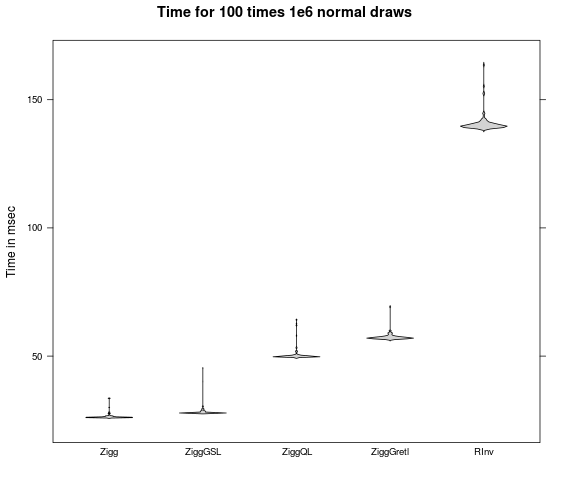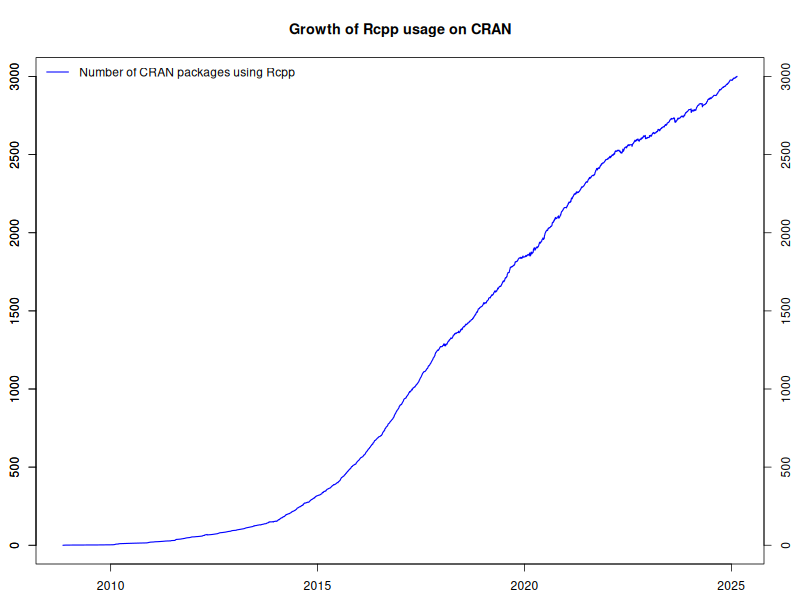
Armadillo is a powerful
and expressive C++ template library for linear algebra and scientific
computing. It aims towards a good balance between speed and ease of use,
has a syntax deliberately close to Matlab, and is useful for algorithm
development directly in C++, or quick conversion of research code into
production environments. RcppArmadillo
integrates this library with the R environment and language–and is
widely used by (currently) 1273 other packages on CRAN, downloaded 41.8 million
times (per the partial logs from the cloud mirrors of CRAN), and the CSDA paper (preprint
/ vignette) by Conrad and myself has been cited 651 times according
to Google Scholar.
Armadillo 15 brought changes. We mentioned these in the 15.0.2-1
and 15.0.2-1
release blog posts:
- Minimum C++ standard of C++14
- No more suppression of deprecation notes
(The second point is a consequence of the first. Prior to C++14,
deprecation notes were issue via a macro, and the macro was set up by Conrad in the common way of
allowing an override, which we took advantage of in RcppArmadillo
effectively shielding downstream package. In C++14 this is now an
attribute, and those cannot be suppressed.)
We tested this then-upcoming change extensively: Thirteen reverse
dependency runs expoloring different settings and leading to the current
package setup where an automatic fallback to the last Armadillo 14
release offers fallback for hardwired C++11 use and Armadillo 15 others.
Given the 1200+ reverse deoendencies, this took considerable time. All
this was also quite extensively discussed with CRAN (especially Kurt
Hornik) and documented / controlled via a series of issue tickets
starting with overall issue #475
covering the subissues:
- open issue
#475 describes the version selection between Armadillo 14 and 15 via
#define
- open issue
#476 illustrates how package without deprecation notes are already
suitable for Armadillo 15 and C++14
- open issue
#477 demonstrates how a package with a simple deprecation note can
be adjusted for Armadillo 15 and C++14
- closed issue
#479 documents a small bug we created in the initial transition
package RcppArmadillo 15.0.1-1 and fixed in the 15.0.2-1
- closed issue
#481 discusses removal of the check for insufficient LAPACK routines
which has been removed given that R 4.5.0 or later has sufficient code
in its fallback LAPACK (used e.g. on Windows)
- open issue
#484 offering help to the (then 226) packages needing help
transitioning from (enforced) C++11
- open issue
#485 offering help to the (then 135) packages needing help with
deprecations
- open issue
#489 coordinating pull requests and patches to 35 packages for the
C++11 transition
- open issue
#491 coordinating pull requests and patches to 25 packages for
deprecation transition
The sixty pull requests (or emailed patches) followed a suggestion by
CRAN to rank-order packages affected by their reverse dependencies
sorted in descending package count. Now, while this change from
Armadillo 14 to 15 was happening, CRAN also tightened the C++11
requirement for packages and imposed a deadline for changes. In
discussion, CRAN also convinced me that a deadline for the deprecation
warning, now unmasked, was viable (and is in fairness commensurate with
similar, earlier changes triggered by changes in the behaviour of either
gcc/g++ or clang/clang++). So we now have two larger deadline campaigns
affecting the package (and as always there are some others).
These deadlines are coming close: October 17 for the C++11
transition, and October 23 for the deprecation warning. Now, as became
clear preparing the sixty pull requests and patches, these changes are
often relatively straightforward. For the former, remove the C++11
enforcement and the package will likely build without changes. For the
latter, make the often simple (e.g. swith from
arma::is_finite to std::isfinite) change. I
did not encounter anything much more complicated yet.
The number of affected packages—approximated by looking at all
packages with a reverse dependency on RcppArmadillo and having
a deadline–can be computed as
suppressMessages(library(data.table))
D <- setDT(tools::CRAN_package_db())
P <- data.table(Package=tools::package_dependencies("RcppArmadillo", reverse=TRUE, db=D)[[1]])
W <- merge(P, D, all.x=TRUE)[is.na(Deadline)==FALSE,c(1:2,38,68)]
W
W[, nrevdep := length(tools::package_dependencies(Package, reverse=TRUE, recursive=TRUE, db=D)[[1]]), by=Package]
W[order(-nrevdep)]
and has been declining steadily from over 350 to now under 200. For
that a big and heartfelt Thank You! to all the
maintainers who already addressed their package and uploaded updated
packages to CRAN. That rocks, and is truly appreciated.
Yet the number is still large. And while issues #489 and
#491
show a number of ‘pending’ packages that have merged but not uploaded
(yet?) there are also all the other packages I have not been able to
look at in detail. While preparing sixty PRs / patches was viable over a
period of a good week, I cannot create these for all packages. So with
that said, here is a different suggestion for help: All of next week, I
will be holding open door ‘open source’ office hours online two times
each day (11:00h to 13:00h Central, 16:00h to 18:00h Central) which can
be booked via this booking
link for Monday to Friday next week in either fifteen or thirty
minutes slots you can book. This should offer Google Meet video
conferencing (with jitsi as an
alternate, you should be able to control that) which should allow for
screen sharing. (I cannot hookup Zoom as my default account has
organization settings with a different calendar integration.)
If you are reading this and have a package that still needs helps, I
hope to see you in the Open Source Office Hours to aid in the
RcppArmadillo package updates for your package. Please book a slot!
This post by Dirk
Eddelbuettel originated on his Thinking inside the box
blog. If you like this or other open-source work I do, you can sponsor me at
GitHub.
/code/rcpp |
permanent link





